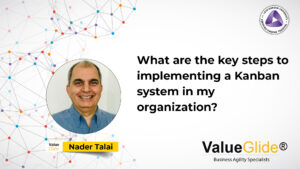Inside a Typical Kanban Training Session: Learning, Application, and Coaching 📚
Introduction: The Essence of Kanban Training
Kanban training sessions are more than just a learning experience; they are immersive, interactive, and deeply informative. These sessions aim to provide not just an understanding of what Kanban is, but also how it can be effectively applied in various work contexts. Let’s dive into what a typical Kanban training session entails and how it benefits participants.
Immersive and Interactive Kanban Learning
Understanding Kanban Fundamentals
- Interactive Approach: Participants are engaged in an immersive learning environment where they explore the fundamentals of Kanban and its system.
- Experiential Learning: The training incorporates real-life experiences and stories, making the concepts relatable and easier to grasp.
Overcoming Misconceptions
Expanding Kanban Knowledge
- Challenging Preconceptions: Many enter the training with a basic understanding of Kanban, often equating it to merely having Post-its on a wall. The training aims to broaden this perspective.
- Realizing Kanban’s Scope: Attendees learn that Kanban encompasses much more than they initially thought, especially its applications in delivery and change management.
Personalized Kanban System Creation
Building Context-Specific Systems
- Tailoring to Individual Contexts: A significant part of the training involves helping participants build their own Kanban system based on their unique workflow and context.
- Guidance and Coaching: Trainers guide and coach participants through the process, ensuring they understand how to adapt Kanban principles to their specific needs.
The Role of Kanban Coaching and Consulting
Enhancing Application and Problem-Solving
- On-Demand Coaching: Post-training, participants often benefit from additional coaching tailored to their specific workplace challenges.
- Addressing Real-World Scenarios: This coaching helps in applying the learned concepts at work, particularly when dealing with specific challenges like determining work-in-progress limits or understanding different types of work.
Combining Kanban Training with Practical Application
A Holistic Learning Experience
- Knowledge and Application: The training sessions provide a foundation in Kanban knowledge, supplemented by experiences, case studies, and stories.
- The Added Value of Consulting: Bundling training with coaching and consulting offers an extended benefit, helping participants apply their learning more effectively and address specific challenges in their work environments.
Conclusion: The Comprehensive Approach to Kanban Training
A typical Kanban training session is a comprehensive journey that combines theoretical learning with practical application. By offering a blend of interactive education, personalized system building, and post-training coaching, these sessions equip individuals with the tools and understanding necessary to implement Kanban effectively in their own contexts. This approach ensures that participants not only learn Kanban but also become adept at applying it to enhance their workflows, collaboration, and change management strategies. 🚀










